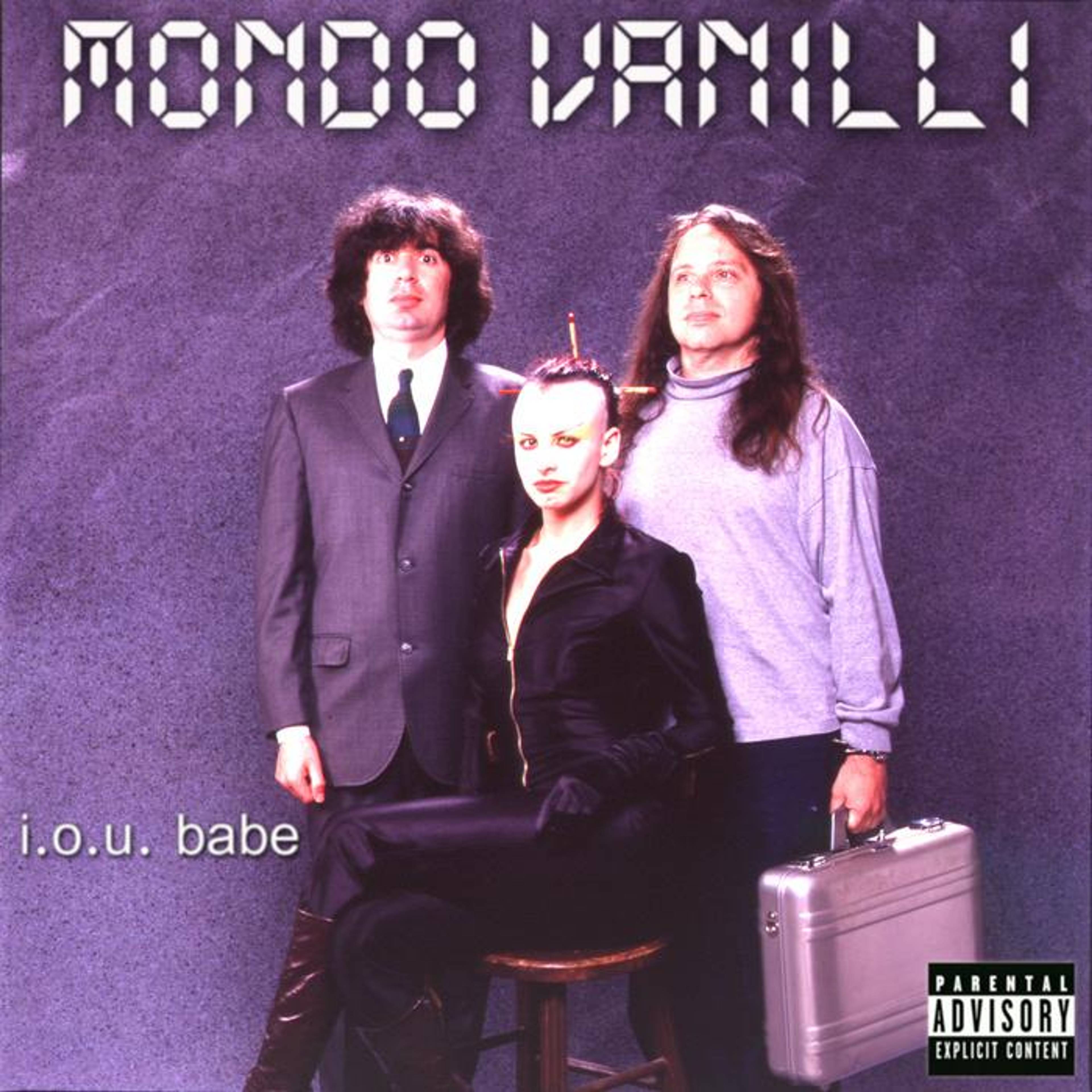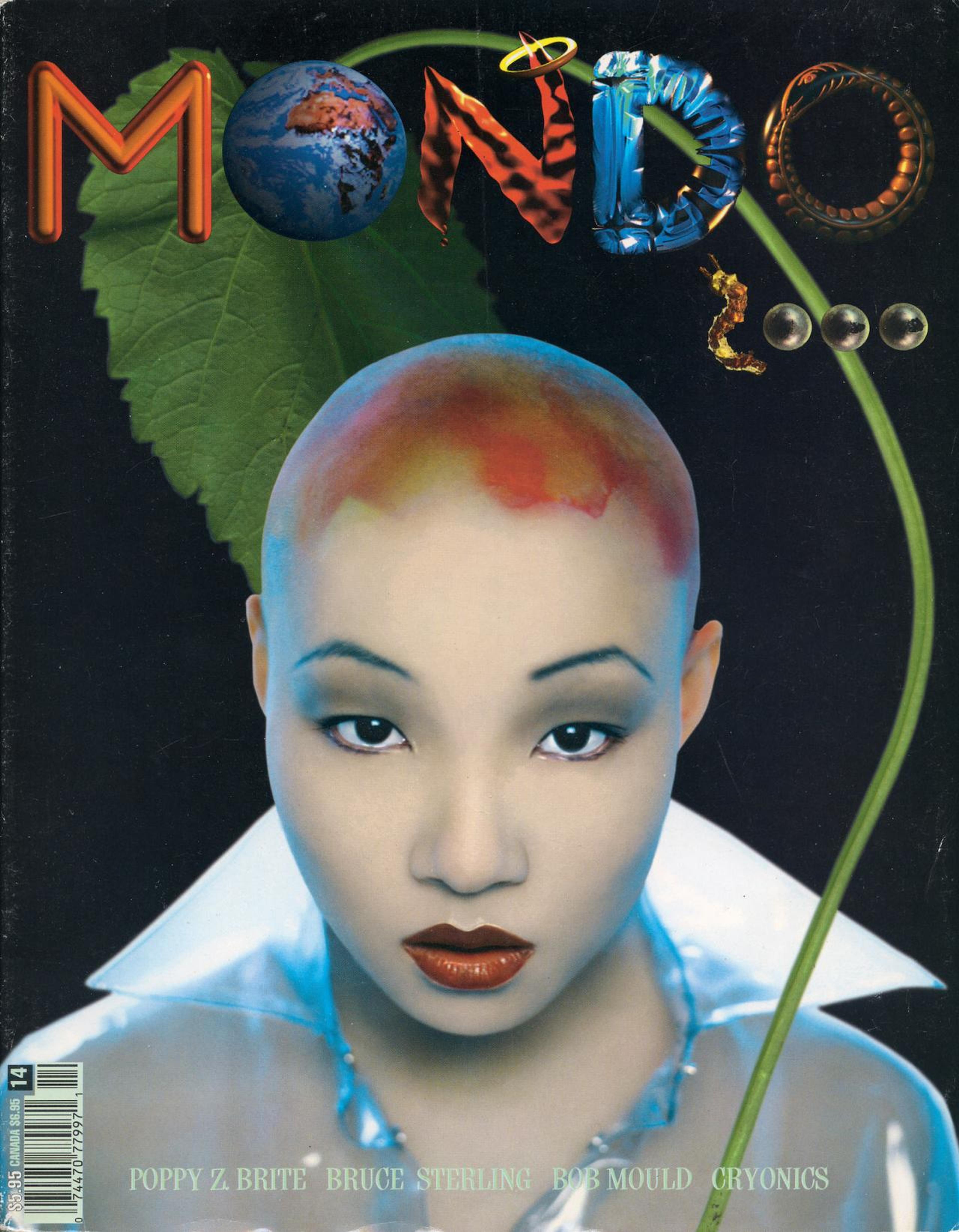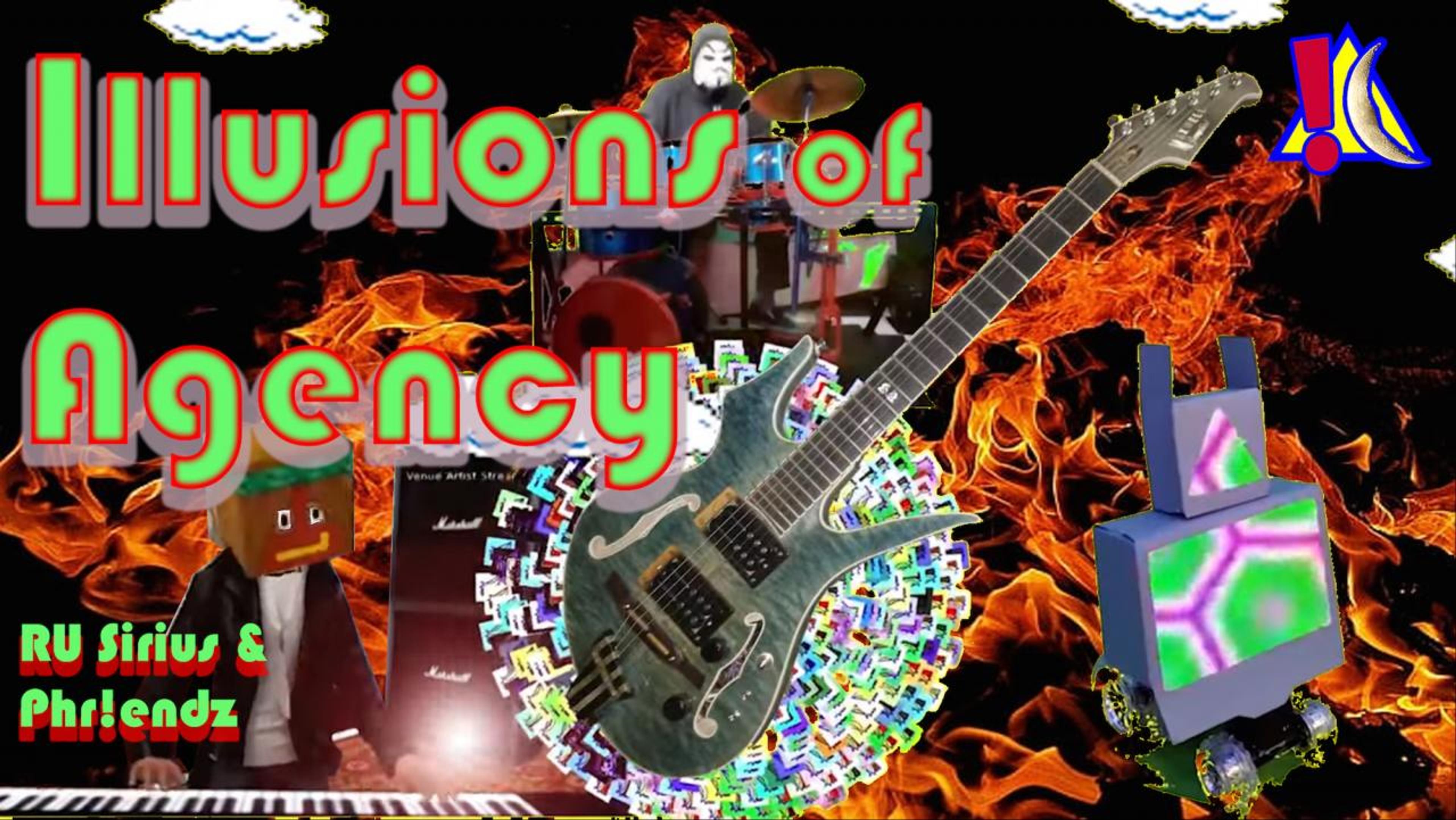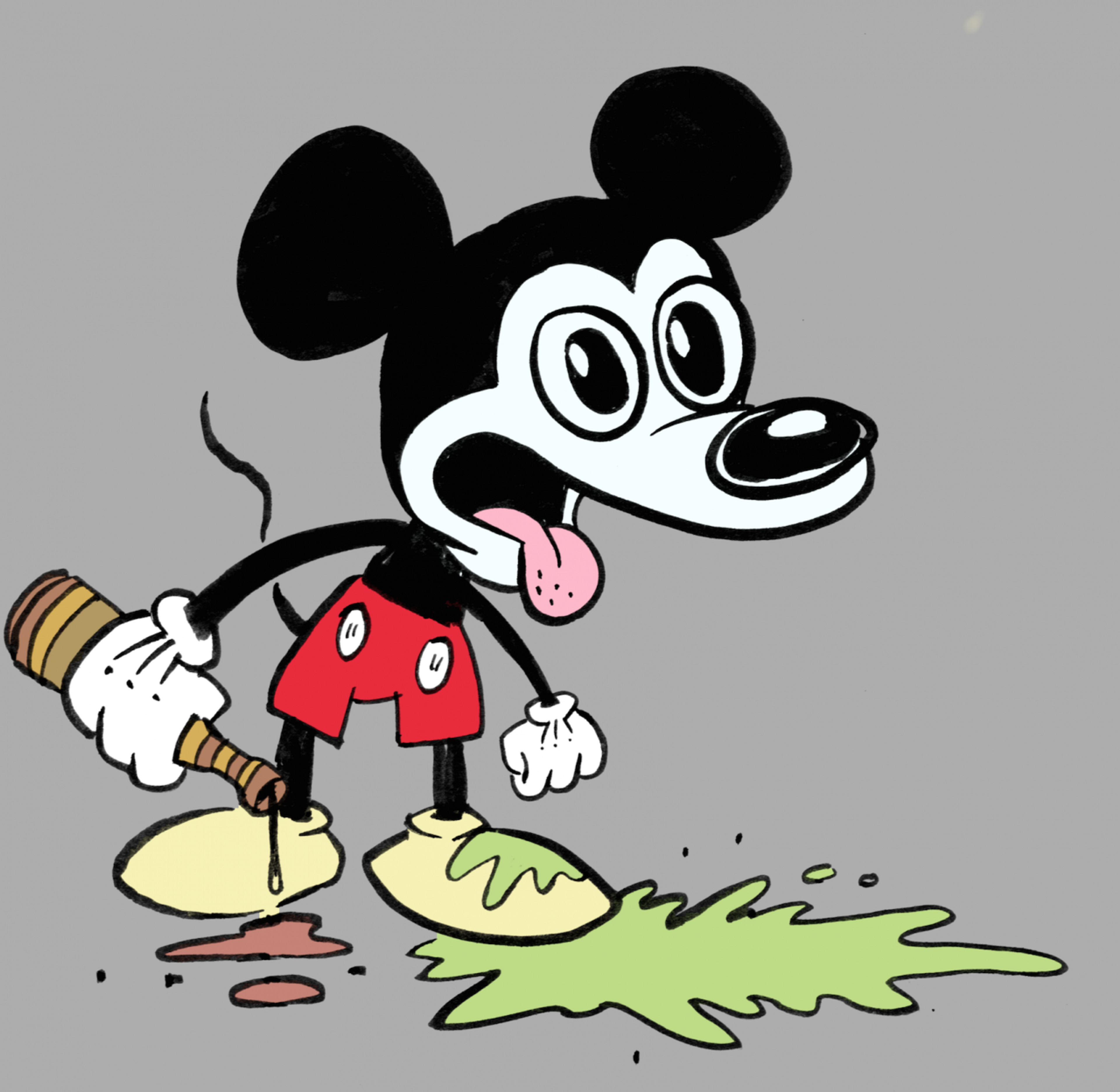It started innocently enough, as the damned so often insist. Time felt taut in early December of 2021 as another year loomed ahead, collectively looked on with hope and horror. Seeking insight, inspiration, or maybe a loving thwack, I turned to my predecessors. More specifically, I turned to R.U. Sirius – a legendary writer, musician, and co-founder of the original cyberpunk rag, Mondo 2000 . I wanted to speak with someone who had weathered the shakedown of history with art, humour, and a dose of healthy delusion. Or derision. Whatever arrived first. Over the course of a couple of months of conversation, we faced a series of existential wallops – what came first, R.U.’s stroke or the Omicron surge? As I recovered from a bout of corona, R.U. fell ill with his own strain. Then, of course, the world fixed its gaze on Putin’s finger, pointing Russia towards invasion of Ukraine. Most of this exchange took place prior to these events, but the underlying truth behind their unfolding – that any attempt to fix anything in that fluctuating projection we call “the future” is increasingly laughable – only intensified. Here’s our conversation, presented without further ado, because apparently, there isn’t any more time for that.
Lydia Sviatoslavsky: What was your original vision for Mondo 2000 ? How did Situationism, surrealism, and psychedelics inform your vision?
R.U. Sirius: Mondo started as High Frontiers . I was pretty much diverted by Timothy Leary and Robert Anton Wilson and their playful, hopeful futurisms, their whole shebang about evolutionary brain circuits being opened up by drugs and technology.
I needed something to get me out of bed at the end of the 1970s. I mean, punk was great – rock and roll was great – but it wasn’t inspiring any action. I remember my friends stole some giant lettering from a sign at a gas station and some of it hung behind the couch in our living room where we took whatever drugs were around and tossed glib nihilisms back and forth. The letters read “ROT”. Tonight’s the Night caught the vibe (some will know what I mean). I couldn’t sink any deeper into that couch, so there was nowhere to go except up into outer space.
The surrealism and so forth were influences that travelled with me when I moved to California to create this new thing based on psychedelics, technology, and incorrigible irreverence that eventually became Mondo 2000 .
Mondo 2000 cover
LS: The internet, which was a prime source of Mondo subject matter, is home to many eyes, rabbit holes, and agents of algorithmic manipulation. Where is cyberpunk culture alive and well in our contemporary moment? Are you still invested and engaged with cyberpunk as a means of exploring radical possibilities and ideas?
RUS: I don’t think it’s really possible to speak of cyberpunk as a trope with any certain definition in the world. I would have said the same thing back in the day. Is it a genre? Is it a movement? If it’s a movement, where does its activism show? There’s hacktivism. There was a momentarily impressive media presence of Anonymous, the hacker group, which just popped up again. There’s cypherpunk… which gets a lot of attention from the crypto cash freaks, as it should ( Mondo ’s own St. Jude was one of the originals and named the group).
But there’s not really a cyberpunk movement in the sense that BLM is a movement, or #MeToo, or Oath Keepers, ad infinitum … or even in the sense of major music movements past and present like hip hop, punk, the raves, etc. It might be a recognizable style of hip people in cool clothes in noir-ish movies, with a rare few replicating it stylistically IRL. Actually, the “R.U. a Cyberpunk” page from an issue of Mondo is the only thing most people below a certain age have ever seen from the magazine … and we were taking the piss out of ourselves.
Surrealism was a movement for a number of years because an anguished control freak named André Breton maintained it in various formations. We didn’t have that person, and if we had, he or she or they probably would have been laughed out of the sandbox for the attempt.
I just had a stroke – mild, as strokes go – and Covid, and in my weakness, I recognize the habitual, rote nature of my attachment to countercultural tropes (like cyberpunk) more definitively than ever. What’s left? Maybe a vast emptiness. Maybe some strong-willed anarchist sorts practicing mutual aid in flooded, bombed-out or burned-out zones? I’ll remain influenced by playful spontaneity from ancient 20th-century moments not because of any dedication, but only because that’s probably the only way I was ever going to be able to write or create. I lack rigor and once declared it a sign of death.
Daddy Phriday, Illusions of Agency, “Fake Fur”
LS: What do you find especially distasteful about contemporary culture in America? Something sour that has emerged in the last 25 years?
RUS: I’m not sure about the word distasteful. I think I’m with John Waters in believing that bad taste is often the best thing.
If I were asked what I find frightening , the response would be obvious, and probably like a lot of other people’s – the apocalypse of climate and the rise of right-wing extremist nationalism.
I guess I get a little sour about a peculiar corner of the online right that has bolted together memeplexes variously composed of punk aesthetics, psychedelics, irreverence, and even libertinism that can roll with – or even be simultaneous with – fundamentalist Christian moralism and the like. Schizo-culture marches on.
I also think about how that old Leary bumper sticker – “Question Authority” – doesn’t scale, because it requires a quality of discernment that I don’t think can be taught … or at least won’t be for a long time. You either have it or you don’t.
I could write a book in a day about the stuff I find annoying and it would get me in trouble with people who seem to admire me, so I tend to hold my tongue. I will only say that I have a very incomplete theory that a lot of the more public younger people – the so-called millennials, GenZ or whatever – have the same pathology and it’s characterized in the extreme by the incels. There’s a peculiar and distinct passive-aggressive flavour that runs from the right to the cultural-oriented left that wishes to politicize and invade people’s psyches and libidos and demands to be seen or fucked – not just in legitimisable broad terms, but intimately. I saw some tweet a few weeks ago in which someone, clearly from a left perspective, appeared to be denouncing people who are not inclined to conjure a libidinal attraction to certain body types. The personal is political, in other words, has always been a potential formulation for a “little brother” surveillance culture. I see these excessive things only on Twitter and only occasionally, so maybe I shouldn’t overstate. I’ll stop there before I get into any more trouble.
LS: How do you think this socially-surveilled (slash servile), embittered, self-censoring mindset will evolve, shift, or degrade over time? It doesn't seem sustainable, does it?
RUS: Of course, I want to emphasize that this is a fragile, incomplete “theory”. Under most circumstances, you would expect a somewhat libertine explosion to follow a period of crouching and cringing. (The whole “cringing” thing deserves an interrogation of its own – does the fact that you’re uncomfortable axiomatically make the other a villain?). Anyway, it could be that if there’s no relief situationally, this sort of reactive state may become fixed for many members of some generations. Of course, when we talk about generations, we’re often talking about a few loud voices and not including all the people who are truly keeping their heads down and just trying to make it through another sick day.
If we might, let’s move momentarily away from piss-takes on the culture of worshipping your broken parts and turning them into works of art, and towards a few observations about one of the real enemies: the great grey men of normalcy who don’t realize that they’ve created an environment conducive to right-wing extremism.
American culture never processed and fixed the “mistake” of Vietnam. We never counted the dead. We had thousands of men come home in caskets or with hurt minds and bodies, and then we immediately careened into Reagan shock capitalism, creating the largest homeless population in an advanced economy existing alongside billionaires with more wealth than something like half of the country; more wars, including a recent illegal one based on falsehoods that went on for untold years; a “war” on some drugs that created the highest percentage of humans in cages in the world as part of a uniquely abusive prison system, and the communities decimated by those losses about which the great grey men now admit, “Whoopsie, another mistak”; a militarized police force enacting brutality against minorities; legalised torture in Guantanamo and elsewhere; Cointelpro, the revelations of total surveillance; and on top of it all, monster storms in perpetuity. (I’ve left much out).
And the political centre, emblematised by American network news, is just shocked by the emergence of a confused and easily-exploited populist right wing? There are actually some right-wing intellectuals who are more accurate about the impact of corporate globalism in creating these conditions of universal precarity than the centre-left talkers are. And that provides some background truths to what is largely a berserker populist reaction.
Chad Essley, Everybody Must Get Rehab , “Fake Fur”
LS: You were a friend of Kathy Acker's – she utilized postmodernist deconstruction of grand narratives in an exciting, generative way, a bit like the surrealists you mentioned earlier. But arguably, a lot of those same gestures have since been wrung out and drained of their original verve for ideologically-driven ends. How has your relationship to these ideas and writers changed over time?
RUS: I went to a very average New York state university in my late twenties, in the late ‘70s and early ‘80s. There was no theory. And for a long time, I barely noticed the relationship between the rather thrilling intervention of radical sort-of post-Marxist theory-driven leftism and academia into my world. It came to me largely through a love of alternative printed materials that I could find at a local bookstore.
Around 1973, when I realized the wild youth revolution wasn’t going to be, you know, an actual political revolution, I became very obsessed with and interested in the art avant-garde, and the history of dada and surrealism and so forth. So I absorbed the whole theory thing from reading Village Voice and avant-garde culture magazines. I discovered Acker in a magazine called Impulse that ran bits of Blood and Guts in High School. I read Semiotext(e) religiously. That was probably the most explicit source for proper theory. Everything else sort of alluded to it.
So I guess I didn’t pay much attention to the authors’ bios. I didn’t think about the fact that they were pretty much all tenured professors – except maybe Andreas Baader and Ulrike Meinhof – from elite academies spinning extreme theories from comfortable sinecures. I mean, not to dismiss too harshly. So much in theory has been inspiring and a joy to read; even if sometimes opaque, the language had a tangled sparkle that felt sort of occult – full of things to be puzzled out.
I didn’t so much understand as absorb the sensibility through my marijuana-soaked skin.
It may not have been until the days of High Frontiers that I focused on the fact that all this theory stuff came from the academy. Between Morgan Russell and myself, we would write stuff that sort of made fun of “curmudgeonly huffy French semioticians” and the like, while at the same time signalling, “Hey, us punks in the neo-psychedelic movement know this stuff, too.”
Now, I’m interested in how this complex difficult area of inquiry we can broadly call “cultural theory” or “critical theory” escaped from academia and stumbled into mainstream discourse – for better or worse. E.g., the nod towards high-end social justice rhetoric in advertising by the insurance company that used to empty out my bank account every month, or the similar messages I find now on my ATM. I mean, everything can be co-opted, so this can’t be full cause for dismissal. But I don’t think these outlets will be advertising free housing or healthcare anytime soon. As I wrote in some (as-yet unrecorded) lyrics:
They’ll give you all the representation you can eat/
But they won’t guarantee you a place to sleep.
I have to consider the possibility that, at some point after 1968, “theory” became a PsyOp to get the (affluent) left to de-emphasize class and war. Possible conspiracy aside, it can doubtless be viewed as functioning that way.
LS: You shared another unrecorded lyric with me, from a song you wrote in 2021 that includes the lines: “While we try to make sense/idea s are being steamrolled by events.” It made me think of this exchange, and how it already seems like it might be in the distant past …
RUS: Well, events seem to trivialize almost anything one can language, and given that I like to be playful and showy with words for its own sake, I suppose there’s no excuse for these indulgences … I mean, usually my attitude is that the world today is bloated with people opinionizing … so, this interview is a mistake!
R.U. Sirius. Photo: Bart Nagel
R.U. SIRIUS is a a writer, editor , musician , and cyberculture iconoclast. He he founded and edited th e magazines High Frontiers and Reality Hackers , and was later the co-publisher of the first popular digital culture magazine, MONDO 2000 , from 1989–1993 . He ran for U.S. President in 2000 as the chairman and candidate from the Revolutionary Party.
LYDIA SVIATOSLAVSKY is a writer, artist, and purveyor of THOUGHT ROT . She is currently based in San Francisco.






